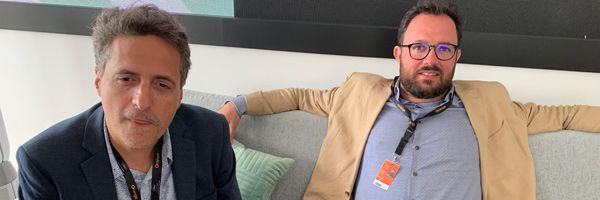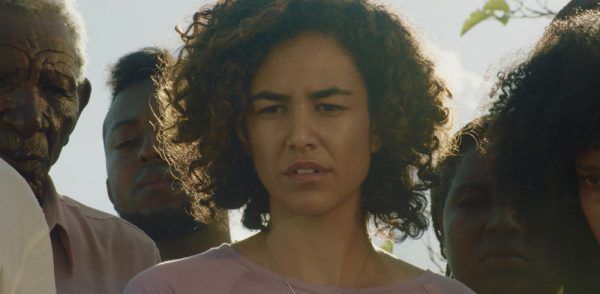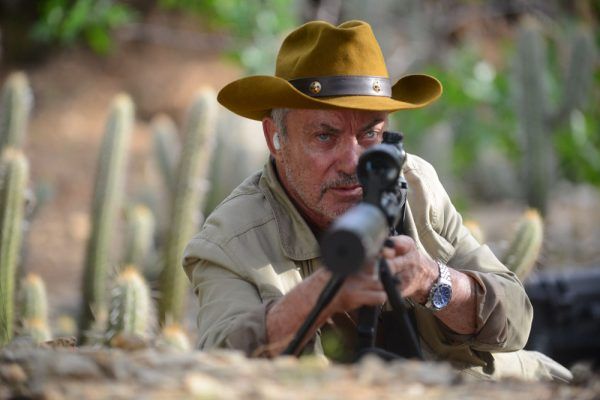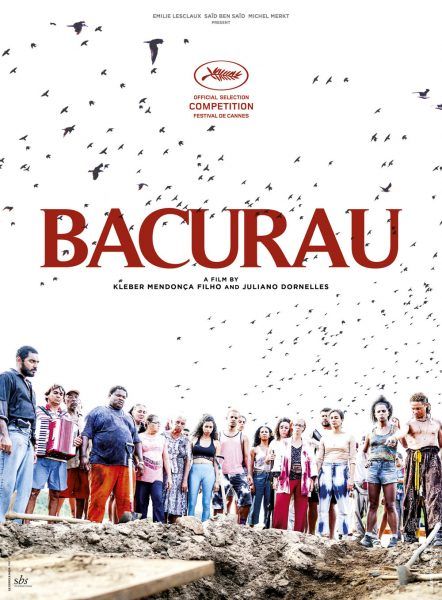Bacurau was the stand out genre film at the 2019 Cannes Film Festival. The Brazilian-French co-production shared the Jury Prize with the tough French suburban drama Les Miserables.
The Cannes Film Festival this year had a distinctive genre bent, initially heralded by Jim Jarmusch’s opening film, The Dead Don’t Die. Though many of the genre films were the product of young French producers who are keen to set the country’s traditional arthouse cinema on a new track. Or at least inject some undead into the proceedings.
Two women producers Judith Lou Levy and Eve Robin were the subject of a profile in the French newspaper Le Monde for their efforts in producing Senegalese-French first-time filmmaker Mati Diop’s Atlantiques and Bertrand Bonello’s Zombi Child via their company Les Films du Bal. Diop’s film, a Senegalese ghost story/romance, was heralded as the first film by a black woman in the competition and would go on to receive the Grand Prix and a distribution deal through Netflix. Seasoned filmmaker Bonello on the other hand had a complete change of focus (after making films including Saint Laurent) in directing Zombi Child, which focused on voodoo in Haiti and then a Haitian teen who would become possessed after moving to France. Or was she already possessed?
Both films (like The Dead Don’t Die) were too understated to truly set the pulses racing. But that was not the case with the bloody and violent Bacurau, a Brazilian-French co-production that would take out the Jury Prize. The film, directed and written by Kleber Mendonca Filho (Aquarius) and Juliano Dornelles, Filho’s usual production designer, was produced by the powerhouse duo of Said Ben Said and Michel Merkt (Elle, Benedetta, Berlin winner Synonymes) who here produce with Emilie Lesclaux, Filho’s French wife, as they had on Aquarius.
With Bacurau, Fulho, who had attended Cannes as a critic for two decades before directing two urban features Neighboring Sounds and Aquarius, is now venturing into the wild west of Brazil, in fact its northeast where he was born, to tell a grisly story of local villagers being hunted down for sport. As with Atlantiques and Zombi Child there’s a sociological/historical subtext and the violence and the allegory with the country’s problems is painfully real. Set in the very near future, the village of Bacarau has disappeared from most maps, there is a corrupt mayor, but locals rally together to take him on.
Bacurau fits in well with your filmography. Are you continuing with the themes of Aquarius, which was in the 2016 Cannes competition?
KLEBER MENDONCA FILHO: Yes, I developed it with Juliano, who I’ve known for 16 years, but it looks and feels different. The whole idea of being off the map is similar to someone trying to tell the woman in Aquarius (Sonia Braga who also appears in Bacurau) to go, that it's a ghost building and she shouldn't be there. It’s basically the same thing, redesigning the world to your own specifications, just because can, which is a very frightening idea because as citizens we can all disappear from the system someday.
But Aquarius was social realism.
KLEBER MENDONCA FILHO: Yes, this one is all out kind of genre. I think Juliano was more comfortable with that than I was, but once I understood that we just went for it.
Can you discuss the allegorical elements in the story.
JULIANO DORNELLES: In Brazil we are having this particular moment in politics that everybody is talking about. But the story in the film is a story that keeps repeating itself. It’s actually nothing really new.
KLEBER MENDONCA FILHO: it happens in many cultures where history keeps repeating itself in the worst possible way. In Brazil the system is completely broken by history itself and now with the new political situation it’s strange because it feels like we’re living in a dystopia. But in fact they are remixing the worst aspects of the last 50 years. They’re actually nostalgic for the 60s when we had a dictatorship.
JULIANO DORNELLES: The white males command it all and the gay people are hiding in the shadows. Society is tortured and very angry about this situation and I hope Bacurau helps these people react and do something. The (Bolsonaro) government is losing popularity every day.
So your film is a trophy of rebellion?
KLEBER MENDONCA FILHO: Yes, under the guise of genre, which I think works. But I also think that throughout history there have been reactions to life and to attacks and invasions and some of them were successful but most of them were not. I always think about the Warsaw Ghetto. They were crushed but they tried to do something. In our film, a political fantasy western, they have to use violence by having access to weapons kept in a museum and I think it works poetically.
You’ve used John Carpenter’s electronic composition Night in the film. You’re a big fan of his films.
KLEBER MENDONCA FILHO: When I was 13 I saw Raiders of the Lost Ark and loved it but knew I could never make something like that. I discovered John Carpenter’s films when I was 14 and thought maybe I could do something like that because they were very small and very strong. Assault on Precinct 13, Halloween, The Fog, The Thing. When I started reading about him he was always going on about Howard Hawks and now I find myself going on about Carpenter, so there is an interesting cycle.
Can you talk about the casting of Bacurau. Aquarius star Sonia Braga plays the alcoholic local doctor, but most of the American cast who play the adventurers, are unknown, except maybe Jonny Mars (Support the Girls).
KLEBER MENDONCA FILHO: We just looked for good American actors and we loved the idea of regular-looking Americans, normal people who are not particularly ugly, beautiful or strong. They were supposed to be amateurs, everyday people who had the opportunity to travel somewhere, to do something despicable, to go on some adventure. One works in a supermarket one in a State Prison and the casting had to make all of that believable.
But then you had Udo Kier as their leader.
KLEBER MENDONCA FILHO: You are absolutely right! Each element in the film has to counterbalance the other elements!
Did you write the screenplay with him in mind given the Nazi joke?
KLEBER MENDONCA FILHO: No, the Nazi joke came after he came on board.
JULIANO DORNELLES: We wrote the screenplay thinking about him after we met him.
KLEBER MENDONCA FILHO: I began to dream about him! (Laughs) I thought the character would be a 60 year-old American guy and then I met Udo in Palm Springs. It was one of the greatest intros in my life. He was wearing a mauve suit and after a woman from the Festival told him there was a Brazilian director he should meet, he turned around and announced, “I was never Fassbinder’s lover.” “Oh nice to meet you Udo”, I said. We spent an hour talking and drinking and then I went back to Brazil and I said to Juliano, “I think Udo Kier could be in our film.”
He has a way of being cast.
KLEBER MENDONCA FILHO: He’s very charming and a great man. He has an amazing sense of humour, he is anarchic and he’s very sweet. The combination is extremely rare.
JULIANO DORNELLES: He has a lot of energy and a very good humour always.
KLEBER MENDONCA FILHO: Imagine shooting 10 hours in 100 degree heat, then he goes back to his hotel, takes a shower, and comes and knocks on the door. “Let’s drink!”
I was also impressed by the force of Silvero Pereira, who plays the villager Lunga. He metes out a lot of the retribution.
JULIANO DORNELLES: Lunga is a very interesting character for us because he transits in the LGBT universe and he’s become a kind of outlaw. He or she is hiding in that fortress; it's a dry dam.
KLEBER MENDONCA FILHO: If you go back to Brazilian history in the 1930s there were outlaws, the Cangaceiros, who caught the imagination of Brazilian society. They were hunted down for years by an extremely vicious section of the police, the volante, and after years on the run they basically ran out of energy and food and money and they were finally caught. They were not only executed, they were massacred in an extremely vicious way. Their heads were cut off and toured around the region for the public to see. They were very modern and wore jewellery and headdresses and were very flashy. They carried a small portable film projector and were very interesting characters.
JULIANO DORNELLES: The men made their own clothes and were very colourful, so Lunga is a cultural offspring of that. Many people saw the Cangaceiros as heroes because they were rebels. They hated official authority figures, the police, the politicians and it's a very violent story. So the idea of the beheadings in Bacurau comes from that time. For you it might sound a little too grisly, but there have been some prison rebellions that have been extremely grisly in recent times in Brazil.
The Mexican directors Guillermo del Toro, Alfonso Cuaron and Alejandro Inarritu (this year’s Cannes jury head) have for the most part moved out of Mexico. But you guys have stayed in Brazil.
KLEBER MENDONCA FILHO: I’ve been reading scripts and would love to make films outside Brazil, but I also love my city and I love my home and would love to stay living in Brazil. My (producer) partner and wife is French, so we spend some time in France during the year. We have to see how things unfold in Brazil, because things are happening too fast. It’s scary.
JULIANO DORNELLES: I started thinking about it a couple of months ago because I started to get pretty scared. But I’m now thinking let’s wait because I have to pay for my bills and what can I do outside of Brazil?
Did you see fellow Brazilian, actor-turned-director Wagner Moura’s film Marighella, a biopic of a Brazilian hero and political renegade?
KLEBER MENDONCA FILHO: I will see it when I attend the Sydney Film Festival where both our films will screen. (Bacurau will be part of the competition. Aquarius won for Best Film in 2016.)
I was very impressed with Wagner Moura as Pablo Escobar in the Netflix series Narcos. I want so see him in more movies. Would you like to work with him?
KLEBER MENDONCA FILHO: I would love to. We are working on it. He’s a great guy.




